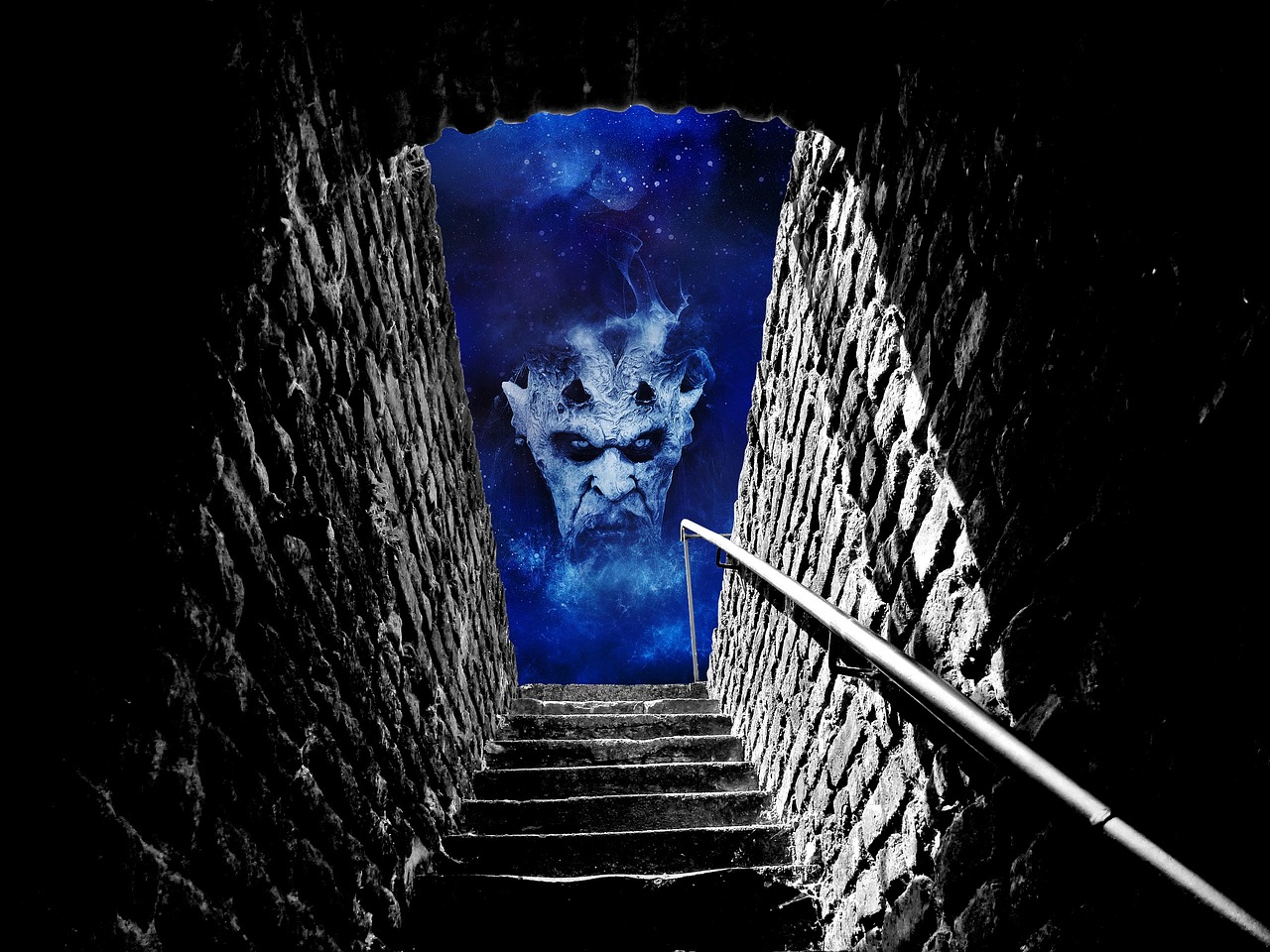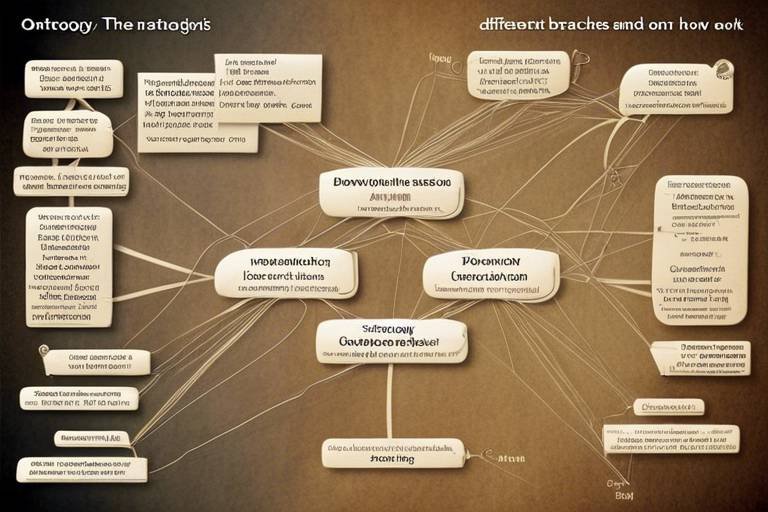Metaphysics - Do All Ideas Start as a Thought?
Welcome to the intriguing world of metaphysics, where we dive deep into the essence of ideas and thoughts. Have you ever pondered whether every single idea we have can be traced back to an initial thought? It's a question that has puzzled philosophers for centuries and continues to resonate in our modern understanding of consciousness. In this exploration, we will dissect the nature of thought, the role of imagination, and the complex interplay of language and experience in shaping our ideas. Are you ready to embark on this philosophical journey?
Understanding what constitutes a thought is crucial in metaphysics. At its core, a thought can be seen as a mental representation or an idea that arises in our minds. But what triggers these thoughts? Is it merely the firing of neurons, or is there a deeper, more profound origin? This question lays the groundwork for exploring how ideas originate and develop within the human mind. Think of thoughts as the seeds of ideas; just as a seed needs the right conditions to grow, thoughts require nurturing and context to flourish into fully formed concepts.
Imagination plays a significant role in generating ideas. It acts as a bridge between our thoughts and the vast realm of possibilities that lie beyond our immediate reality. Through imagination, we can conjure up scenarios, create art, and even formulate scientific theories. It's like having a mental playground where ideas can frolic and evolve. But how does this imaginative process contribute to the formation of thoughts and concepts in metaphysical theory? Let's explore this further.
When we think about imagination, we often juxtapose it with reality. Imaginative thoughts can transport us to fantastical worlds, yet they can also provide insights into our tangible existence. Metaphysics interprets this relationship in various ways, suggesting that while imagination can create new ideas, it must also contend with the constraints of reality. For instance, a scientist may imagine a groundbreaking theory, but its acceptance hinges on empirical validation. This interplay between imagination and reality is a fascinating aspect of how we construct our understanding of the world.
Exploring the boundaries of human imagination reveals insights into how far thoughts can stretch before they encounter the constraints of reality. While our minds can envision endless possibilities, there are limits based on our experiences and knowledge. Imagine trying to conceive of a color you've never seen; it’s nearly impossible, right? Similarly, our thoughts are often bound by our perceptions and the information we have at hand. This limitation prompts us to ask: how can we expand our imaginative capacities to foster richer ideas?
Philosophers have long debated the significance of imagination in shaping ideas. From Plato to Kant, the role of imagination has been central to discussions about knowledge and existence. Plato viewed imagination as a lower form of knowledge, while Kant saw it as a necessary component for synthesizing experiences. This ongoing dialogue highlights how imagination is not merely a whimsical tool but a vital part of our cognitive processes that shapes our metaphysical inquiries.
Investigating how initial thoughts can serve as catalysts for broader ideas is essential in metaphysical discussions. Think about how a single thought—a fleeting idea—can spark a series of innovations or philosophical movements. For instance, consider how the thought of freedom inspired revolutions across the globe. This transformative power of thought illustrates that ideas are not static; they evolve and expand, often leading to profound changes in society and culture.
The journey from an initial thought to a fully developed concept involves several stages. It begins with a raw idea, which is then refined through imagination, experience, and language. Each stage is critical, as it influences the final form of the idea. Metaphysically speaking, this process raises questions about the nature of reality and how our perceptions shape our understanding of existence. Are our ideas mere reflections of our thoughts, or do they possess an independent existence?
Experience significantly shapes our thoughts and ideas. Every encounter, every lesson learned, adds layers to our understanding. Personal experiences inform our individual perspectives, while collective experiences shape societal norms and beliefs. This interplay suggests that our ideas are not formed in isolation; they are deeply intertwined with the fabric of our lived experiences. So, when we contemplate the origins of an idea, we must consider the rich tapestry of experiences that contribute to its formation.
Language is a crucial tool for expressing thoughts. It serves as the medium through which we communicate our ideas, but it also influences how we think. The relationship between language and thought is a fascinating area of study in metaphysics. Some argue that our thoughts are limited by the language we possess, while others contend that language is merely a vessel for our more profound thoughts. This dynamic interplay raises essential questions about the nature of thought itself and how we articulate our ideas in the world.
Various philosophical schools offer differing views on the origin of ideas. Some propose that ideas are innate, while others argue they are derived from sensory experiences. These perspectives shape our understanding of metaphysical thought and highlight the complexity of idea formation. By examining these viewpoints, we can gain deeper insights into the nature of our thoughts and the philosophical implications they carry.
The debate between idealism and materialism centers on the nature of ideas. Idealism posits that reality is fundamentally mental, while materialism asserts that physical matter is the primary substance of reality. Each philosophy interprets the origin and significance of thoughts differently, leading to rich discussions about the essence of existence and consciousness. Are our thoughts mere byproducts of our physical brains, or do they possess a more profound significance?
Existentialism emphasizes individual experience and thought. This philosophy invites us to confront our existence and the thoughts that arise from it. By focusing on personal freedom and responsibility, existentialists argue that our thoughts shape our reality. This perspective encourages us to reflect on the nature of our ideas, urging us to consider how our unique experiences inform our understanding of existence and the world around us.
- What is metaphysics? Metaphysics is a branch of philosophy that explores the fundamental nature of reality, including concepts such as existence, being, and the universe.
- Do all ideas originate from thoughts? While many ideas begin as thoughts, the process of idea formation is complex and influenced by various factors, including experience and language.
- How does imagination contribute to idea formation? Imagination allows us to explore possibilities beyond our immediate reality, playing a crucial role in generating and refining ideas.

The Nature of Thought
Understanding what constitutes a thought is a fundamental aspect of metaphysics, as it lays the groundwork for exploring how ideas originate and develop within the human mind. At its core, a thought can be seen as a mental representation or an abstract concept that arises in our consciousness. But what exactly triggers these thoughts? Is it purely a product of our environment, or is there a deeper, more intrinsic mechanism at play?
When we think about thoughts, it's essential to recognize that they are not just random flickers in our minds. They're often the result of a complex interplay of various factors, including our emotions, experiences, and even our biological makeup. For instance, when we encounter a new experience, it can evoke a series of thoughts that may lead to new ideas, concepts, or even solutions to problems we face. This process is akin to planting a seed in fertile soil; with the right conditions, it can blossom into something beautiful and transformative.
Moreover, the nature of thought is deeply intertwined with our perception of reality. We can think of thoughts as lenses through which we view the world. Each thought can color our understanding and perception of our surroundings, shaping our beliefs and actions. This is where metaphysics comes into play, as it seeks to understand these underlying connections between thoughts, ideas, and the nature of existence itself.
Interestingly, thoughts can also be categorized into various types, such as:
- Abstract Thoughts: These are ideas that are not tied to physical objects, such as concepts of justice, love, or freedom.
- Concrete Thoughts: These relate to tangible objects or specific experiences, like remembering a favorite meal or the color of a car.
- Creative Thoughts: These thoughts lead to new ideas, innovations, or artistic expressions, showcasing the power of imagination.
In essence, the nature of thought is a multi-faceted phenomenon that serves as the bedrock for our understanding of ideas. It invites us to ponder not only what we think but also how and why we think in certain ways. This exploration leads us down a path of self-discovery and philosophical inquiry, urging us to question the very fabric of our reality and the role our thoughts play in shaping it.

The Role of Imagination
Imagination is often hailed as the gateway to creativity, and in the realm of metaphysics, it plays a pivotal role in shaping our thoughts and ideas. But what exactly is imagination? It’s not just daydreaming or fanciful thinking; it’s a profound cognitive process that allows us to visualize possibilities beyond our immediate reality. Imagine standing at the edge of a cliff, looking out over a vast ocean. The waves crash against the rocks, and as you breathe in the salty air, your mind begins to wander. You might envision a world beneath the surface, teeming with colorful fish and mysterious shipwrecks. This is imagination at work—transforming a simple moment into a canvas of endless possibilities.
In metaphysical theory, imagination is more than a mere tool; it is a fundamental aspect of how we construct our understanding of the universe. It allows us to connect disparate ideas, to synthesize experiences into coherent thoughts, and to explore concepts that may not yet exist in tangible form. For instance, when we think about abstract concepts like justice or freedom, we rely heavily on our imaginative faculties to give these ideas shape and meaning. Without imagination, we would be limited to what we can see and touch, trapped in a world devoid of innovation and creativity.
Moreover, imagination serves as a bridge between the known and the unknown. It enables us to hypothesize about things we cannot directly observe. Consider scientific advancements; many groundbreaking theories began as imaginative thoughts. Scientists like Albert Einstein and Nikola Tesla utilized their imagination to envision concepts that were far beyond the understanding of their time. They didn't merely accept the world as it was; they imagined what it could be. This imaginative leap is crucial in metaphysical discussions, where the boundaries of reality often blur.
However, while imagination is a powerful force, it’s essential to recognize its limitations. Just as a painter can only create with the colors available on their palette, our imagination is shaped by our experiences, knowledge, and cultural backgrounds. This interplay of imagination and reality is fascinating. We can create entire worlds in our minds, but those worlds must still resonate with some aspect of our lived experience. For instance, if someone has never seen the ocean, their imaginative depiction of it may be influenced by stories, pictures, or even movies, but it will lack the depth of someone who has experienced it firsthand.
In philosophical thought, the significance of imagination has been debated for centuries. Thinkers like Immanuel Kant argued that imagination is not merely a passive receiver of sensory information but an active participant in shaping our perceptions. It organizes our experiences and allows us to form concepts that can be communicated and shared with others. This is where the role of language comes into play, as our imaginative thoughts often find expression through the words we choose.
In summary, imagination is the lifeblood of idea generation in metaphysical inquiry. It empowers us to explore, innovate, and understand the world in ways that transcend our immediate experiences. Without it, we would be confined to a narrow view of reality, unable to dream or conceive of what lies beyond. So, the next time you find yourself lost in thought, remember that you are engaging in a crucial part of the human experience—a dance between imagination and reality that fuels the creation of ideas.

Imagination vs. Reality
When we dive into the depths of metaphysical thought, one of the most intriguing comparisons we can make is between imagination and reality. Imagine standing at the edge of a cliff, peering into the vast abyss below. What you see is a breathtaking view, a reality that exists outside of your mind. Yet, the moment you close your eyes, your imagination takes over, painting a picture of a world that could be — a world filled with vibrant colors, fantastical creatures, and limitless possibilities. This dichotomy raises profound questions: How do we distinguish between what is imagined and what is real? Can our thoughts shape our reality, or are they merely reflections of it?
The relationship between imagination and reality is akin to a dance, where each partner influences the other. On one hand, imagination allows us to envision scenarios that have never existed, pushing the boundaries of our understanding. On the other hand, reality serves as a grounding force, reminding us of the limitations we face. For instance, consider the process of creating a piece of art. An artist begins with a vision — a mental image that exists solely in their mind. As they translate that vision onto canvas, they navigate the constraints of their materials and techniques, ultimately merging imagination with reality.
Furthermore, the metaphysical implications of this relationship are profound. Philosophers have long debated whether imagination is a mere byproduct of reality or if it holds a more significant role in shaping it. Some argue that our imaginative capabilities allow us to perceive reality in new ways, suggesting that our thoughts can indeed alter our experiences. Others contend that reality is an immutable force, one that exists independently of our perceptions. This leads us to ask: Are we mere observers of reality, or are we active participants in its creation?
To illustrate this complex interplay, consider the following table that outlines key differences between imagination and reality:
| Aspect | Imagination | Reality |
|---|---|---|
| Nature | Subjective, personal interpretations | Objective, universally accepted facts |
| Influence | Can inspire change and innovation | Shapes our experiences and perceptions |
| Limitations | Boundless, limited only by creativity | Constrained by physical laws and circumstances |
| Examples | Dreams, fantasies, artistic concepts | Natural phenomena, historical events |
This table highlights that while imagination is boundless and subjective, reality is concrete and universal. Yet, the two are not mutually exclusive. Our imaginative thoughts can lead to innovations that change reality, such as technological advancements born from creative ideas. For example, the concept of flight was once merely a dream held by imaginative minds, but through perseverance and ingenuity, it became a reality that transformed the world.
In essence, the interplay between imagination and reality is a fundamental aspect of our existence. It prompts us to question our perceptions and challenges us to explore the depths of our creative potential. As we navigate through life, we must recognize that while reality serves as our foundation, our imagination is the canvas upon which we can paint our dreams. So, the next time you find yourself daydreaming, remember: you might just be laying the groundwork for the next great idea that could reshape reality.

The Limits of Imagination
Imagination is often celebrated as the limitless realm where creativity knows no bounds. However, when we dive deeper into the philosophical waters of metaphysics, we encounter the intriguing concept of the limits of imagination. It's fascinating to consider that while our minds can conjure up fantastical worlds and innovative ideas, there are inherent constraints that shape and define these mental constructs. Just like a painter is bound by the dimensions of their canvas, our imagination operates within certain parameters influenced by reality, experience, and even cultural context.
One of the primary limitations of imagination is its reliance on experience. Our past experiences act as a filter, guiding the way we envision new ideas. For instance, if someone has never encountered the concept of a "flying car," their imagination might struggle to visualize it, even though it exists in the realm of possibility. This limitation highlights the idea that imagination is not purely a spontaneous act but is often tethered to our lived realities. In this sense, imagination is a fascinating blend of the known and the unknown, where the known serves as a launching pad for the unknown.
Moreover, the interplay between language and imagination cannot be overlooked. Language provides the vocabulary and structure through which we articulate our thoughts and ideas. Without the ability to express our imaginative concepts in words, they may remain nebulous and unformed. This brings forth the question: can we truly imagine something if we lack the words to describe it? The limitations of language can stifle our imaginative capacity, suggesting that our thoughts are inextricably linked to the linguistic frameworks we inhabit.
Another fascinating aspect to consider is how cultural influences shape our imaginative boundaries. Different cultures foster unique ways of thinking, which can either expand or constrict the imaginative possibilities available to individuals. For example, a culture that values innovation may encourage its members to think outside the box, while a more conservative culture might prioritize tradition and stability, thus limiting imaginative exploration. This cultural lens creates a rich tapestry of imaginative potential, but also reveals the constraints that can shape our creative endeavors.
In examining the limits of imagination, we also confront the idea of physical reality. No matter how grand our imaginative constructs may be, they must ultimately align with the laws of physics and the tangible world we inhabit. This is not to say that imagination is impotent; rather, it serves as a powerful tool for envisioning possibilities and pushing the boundaries of what can be achieved. Yet, the moment we attempt to bring these imaginative visions into reality, we encounter the practical limitations imposed by our environment.
In conclusion, while imagination is a wondrous aspect of human cognition, it is essential to recognize its limits. These boundaries do not diminish the power of imagination; instead, they highlight the dynamic interplay between thought and reality. As we navigate this intricate landscape, we can better appreciate how our thoughts, shaped by experience, language, culture, and reality, lead to the flourishing of ideas. Understanding these limits can inspire us to explore the vast potential of our minds while acknowledging the frameworks that guide our imaginative journeys.
- What are the primary limitations of imagination? Imagination is primarily limited by experience, language, cultural influences, and the laws of physical reality.
- How does experience shape our imagination? Our past experiences filter our perceptions and influence how we visualize new ideas, often constraining our imaginative explorations.
- Can language limit our imagination? Yes, the lack of vocabulary can hinder our ability to articulate and thus fully conceive imaginative ideas.
- Do cultural influences affect imagination? Absolutely! Different cultures foster diverse ways of thinking, which can either expand or limit imaginative possibilities.

Imagination in Philosophical Thought
The role of imagination in philosophical thought is a captivating subject that has intrigued thinkers for centuries. Philosophers like Immanuel Kant and David Hume have emphasized the importance of imagination as a fundamental component of human cognition. Imagination is not merely a whimsical faculty; it is a powerful tool that shapes our understanding of the world and our place within it. For instance, Kant proposed that our experiences are filtered through the lens of imagination, allowing us to make sense of the chaotic stimuli we encounter. This perspective suggests that imagination is crucial in constructing the very fabric of our reality.
Moreover, the interplay between imagination and reason is a recurring theme in philosophical discourse. Thinkers such as Friedrich Nietzsche argued that imagination is vital for transcending conventional thought and exploring new possibilities. He believed that the capacity to envision alternative realities could lead to profound insights and innovations. In this light, imagination becomes a catalyst for change, challenging the status quo and opening up avenues for creative thought.
However, the philosophical exploration of imagination doesn't stop there. The Romantic philosophers, for example, celebrated imagination as a means of accessing deeper truths about existence. They posited that through imaginative processes, individuals could tap into the collective unconscious, revealing universal themes and archetypes that resonate across cultures. This idea aligns with the notion that imagination serves as a bridge between the individual and the collective, allowing for a shared understanding of human experience.
Interestingly, the debate surrounding imagination also encompasses its limitations. While imagination can propel us into realms of possibility, it can also lead us astray if not grounded in reality. Philosophers like Bertrand Russell cautioned against the unchecked power of imagination, highlighting the necessity of balancing imaginative thought with empirical evidence. This tension between imagination and reality is what makes the philosophical inquiry into imagination both rich and complex.
In summary, the significance of imagination in philosophical thought cannot be overstated. It serves as a critical mechanism for understanding, creating, and transforming ideas. Whether it is through the lens of Kantian constructs or the expansive visions of Romantic thinkers, imagination remains a central focus in the quest to unravel the mysteries of existence. The exploration of imagination invites us to consider how our thoughts not only reflect our experiences but also shape the very ideas that define our reality.
- What is the role of imagination in philosophy? Imagination is essential in philosophy as it helps shape our understanding of concepts, enabling us to explore and create new ideas.
- How do different philosophers view imagination? Different philosophers have various perspectives; for instance, Kant sees it as a tool for understanding experiences, while Nietzsche views it as a means to challenge conventional thought.
- Can imagination lead to misconceptions? Yes, unchecked imagination can lead to misconceptions if it is not balanced with empirical evidence and reality.

Thoughts as Catalysts for Ideas
Have you ever had a fleeting thought that spiraled into a whirlwind of ideas? It’s almost like a spark igniting a fire, isn’t it? In the realm of metaphysics, thoughts are not just fleeting moments; they are the very catalysts that propel us into the vast universe of ideas. When we think, we open the door to a world where possibilities are limitless and creativity knows no bounds. But how does this transformation occur? Let's dive deeper into this fascinating process.
At the core of this phenomenon is the notion that thoughts serve as the initial building blocks for ideas. Just like a single seed can grow into a towering tree, a single thought can branch out into numerous ideas, each with its own potential for growth and development. For instance, consider the thought of "freedom." This simple idea can evolve into various concepts such as liberty, independence, self-expression, and even social justice. Each of these ideas stems from the original thought, showcasing how one spark can lead to a flourishing garden of concepts.
Moreover, thoughts often act as catalysts in moments of inspiration. Think about the last time you were struck by a brilliant idea. Perhaps you were daydreaming, doodling, or simply enjoying a quiet moment when suddenly, a thought popped into your mind. This is where the magic happens! The initial thought captures your attention and ignites a chain reaction, leading you to explore related ideas and possibilities. It's akin to a chain reaction in chemistry, where one reaction leads to another, ultimately resulting in something entirely new and unexpected.
In the broader context of metaphysical inquiry, thoughts can also reflect our belief systems and perceptions of reality. They shape how we interpret our experiences and understand the world around us. For example, if someone holds the thought that "all people are inherently good," this belief can lead to ideas about compassion, forgiveness, and community service. Conversely, a thought rooted in skepticism may lead to ideas about caution and self-preservation. Thus, our thoughts not only catalyze ideas but also frame our understanding of existence itself.
Additionally, the interplay between thoughts and emotions cannot be overlooked. Thoughts often stir feelings, and these feelings can further influence the ideas that emerge. For instance, a thought about a loved one may evoke feelings of joy, prompting ideas about celebration or connection. On the flip side, a thought about a past failure may bring forth feelings of regret, leading to ideas about growth and resilience. This dynamic relationship illustrates how thoughts serve as both catalysts and filters through which we experience and interpret our reality.
In summary, thoughts are not merely random occurrences; they are powerful catalysts that shape our ideas and, ultimately, our understanding of the world. By recognizing the transformative power of our thoughts, we can harness this energy to foster creativity, innovation, and deeper insights into the nature of existence. So, the next time you find yourself lost in thought, remember that you are on the brink of a new idea waiting to be discovered!
- What is the role of thoughts in idea generation? Thoughts serve as the initial spark that can lead to the development of ideas, acting as catalysts for creativity and innovation.
- How can I harness my thoughts to generate better ideas? By being mindful of your thoughts and allowing them to flow freely, you can explore various possibilities and cultivate a richer pool of ideas.
- Can negative thoughts influence idea formation? Yes, negative thoughts can shape our ideas and perceptions, often leading to more cautious or defensive ideas.

The Process of Idea Formation
Understanding the process of idea formation is like peeling an onion—each layer reveals something deeper and more complex. At its core, idea formation begins with a simple thought, a flicker in the mind that can ignite a wildfire of creativity. This initial thought is often sparked by a variety of influences, including experience, imagination, and even external stimuli. To grasp how these elements interact, we can break down the process into several stages:
- Initial Thought: This is the seed from which all ideas grow. It can be spontaneous or arise from contemplation.
- Imaginative Expansion: Once a thought takes root, imagination kicks in, allowing us to explore possibilities and variations.
- Refinement: Through critical thinking and reflection, we refine our ideas, honing them into something more coherent.
- Expression: Finally, we articulate our ideas through language or other forms of communication, sharing them with the world.
Each of these stages plays a crucial role in the metaphysical implications of our thoughts. For instance, the initial thought may be influenced by our personal experiences, cultural background, or even fleeting emotions. This is where the magic happens—our unique perspectives shape the way we perceive and develop ideas. Think of it as a painter starting with a blank canvas; the colors and strokes represent our thoughts, influenced by our experiences and imagination.
Moreover, the interplay between thought and experience cannot be overstated. Our past encounters, both positive and negative, inform our thought processes. For example, a person who has traveled extensively may have a more nuanced understanding of cultural concepts compared to someone who has never left their hometown. This accumulated knowledge adds depth to the initial thought, transforming it into a rich tapestry of ideas.
Language also plays a pivotal role in this process. It acts as the bridge between thought and expression, allowing us to communicate our ideas effectively. The words we choose can shape the way our ideas are received. Think about it: the same concept can evoke different reactions based on how it is articulated. This is why philosophers often emphasize the importance of language in metaphysical discussions—it’s not just about what we think, but how we convey those thoughts to others.
In summary, the process of idea formation is a dynamic interplay of thought, imagination, experience, and language. Each stage contributes to the evolution of ideas, leading us to a deeper understanding of the world around us. As we navigate through these layers, we uncover the profound connections between our thoughts and the broader metaphysical landscape.
Q: What is the first step in the idea formation process?
A: The first step is the initial thought, which can be sparked by various influences such as experience or external stimuli.
Q: How does imagination contribute to idea formation?
A: Imagination allows us to expand upon our initial thoughts, exploring possibilities and variations that can lead to more complex ideas.
Q: Why is language important in the process of idea formation?
A: Language serves as the medium through which we express our thoughts, shaping how our ideas are communicated and understood by others.
Q: Can personal experiences affect the way we form ideas?
A: Yes, personal experiences play a significant role in shaping our thoughts and ideas, adding depth and context to our understanding.

Influence of Experience
Experience is a powerful force in shaping our thoughts and ideas; it acts as the canvas upon which our mental pictures are painted. Think about it: every moment we live, every interaction we have, and every challenge we face contribute to our unique tapestry of understanding. This rich blend of experiences influences not just what we think but also how we think. For instance, a person who has traveled extensively may have a broader perspective on cultural ideas compared to someone who has lived in the same place their entire life. Isn’t it fascinating how our surroundings and experiences mold our thoughts?
Moreover, experience allows us to connect abstract ideas with concrete realities. It’s like having a toolbox; the more tools (or experiences) you have, the more equipped you are to tackle complex problems. When we encounter new situations, our minds draw upon past experiences to navigate through them. This interplay between past and present is crucial in metaphysical discussions about the origins of ideas. It raises a compelling question: do our thoughts originate in isolation, or are they deeply intertwined with the tapestry of our lived experiences?
To illustrate this further, let’s consider a few key influences of experience on thought formation:
- Personal Experiences: These are the unique events that shape our individual perspectives, such as family upbringing, education, and life challenges.
- Collective Experiences: Shared experiences within a community or culture can lead to common ideas and beliefs that transcend individual thoughts.
- Emotional Responses: Emotions tied to experiences can amplify certain thoughts, making them more significant and impactful in our minds.
In essence, our thoughts do not exist in a vacuum; they are influenced by the cumulative weight of our experiences. This concept aligns with various philosophical schools that emphasize the importance of experience in understanding the nature of ideas. For example, empiricism posits that knowledge arises from sensory experiences, suggesting that our thoughts are fundamentally rooted in what we perceive and encounter.
Additionally, the interplay between experience and thought can be observed in creative processes. Artists, writers, and thinkers often draw upon their experiences to fuel their creativity. The act of reflecting on past events can ignite new ideas, leading to innovative concepts that may not have emerged otherwise. This cyclical relationship between experience and thought is what makes the exploration of metaphysics so captivating. It invites us to consider: how much of our understanding of the world is shaped by what we have lived through?
In conclusion, the influence of experience on thought is profound and multifaceted. As we navigate through life, our experiences continually inform and transform our ideas, making them richer and more complex. This ongoing dialogue between thought and experience not only enhances our understanding of metaphysics but also underscores the deeply interconnected nature of human existence.
- How do personal experiences shape our thoughts?
Personal experiences provide context and meaning to our thoughts, helping us to interpret and understand the world around us. - Can collective experiences influence individual ideas?
Yes, collective experiences can create shared beliefs and ideas, impacting how individuals think within a community. - What role do emotions play in shaping thoughts?
Emotions can amplify the significance of certain thoughts, making them more prominent in our minds.

The Interplay of Language and Thought
Language and thought are intricately woven together, creating a tapestry of expression that defines our understanding of the world. Think about it: when you have a thought, how often do you find yourself trying to articulate it? This relationship is not merely coincidental; it’s fundamental to how we process and share our ideas. Language serves as the vehicle for our thoughts, enabling us to convey complex ideas and emotions. Without language, our thoughts would remain locked within the confines of our minds, unable to connect with others.
At its core, the interplay between language and thought raises fascinating questions about the nature of reality and perception. Does language shape our thoughts, or do our thoughts shape language? This philosophical conundrum has sparked debates among scholars for centuries. Some argue that our linguistic capabilities limit our thoughts, a theory known as linguistic relativity. According to this view, the words we use can influence how we think and perceive the world around us. For instance, consider how different cultures have unique words for concepts that may not exist in other languages. This linguistic diversity suggests that our thoughts are, to some extent, shaped by the language we use.
On the other hand, there’s the perspective that thoughts precede language. This viewpoint posits that we form ideas and emotions internally before we find the words to express them. For example, when you experience a profound emotion like love or grief, you may feel it deeply before you can articulate it. The challenge lies in translating those complex feelings into language that others can understand. This process can be frustrating, as the subtleties of our thoughts may not always fit neatly into the confines of language.
Moreover, the relationship between language and thought extends beyond individual experiences; it plays a significant role in societal communication. Consider how political rhetoric can shape public opinion. The way ideas are framed in language can influence how they are received and understood by the masses. For example, using emotionally charged language can evoke strong reactions, while neutral language may lead to more measured responses. This illustrates the power of language as a tool for shaping collective thought.
To further illustrate the interplay between language and thought, let’s explore a simple table that highlights key differences between the two concepts:
| Aspect | Language | Thought |
|---|---|---|
| Definition | A system of communication using symbols, sounds, and gestures. | The mental process of thinking, reasoning, and conceptualizing. |
| Function | To express and communicate ideas. | To generate and process ideas internally. |
| Influence | Can shape perceptions and social interactions. | Can drive the creation of language and expression. |
In conclusion, the interplay between language and thought is a dynamic and complex relationship that continues to evolve. As we navigate through life, our thoughts are constantly being shaped by the language we encounter, while simultaneously, our language evolves based on the thoughts we share. It’s a beautiful dance of expression that enriches our understanding of ourselves and the world around us.
- How does language influence thought? Language can shape our perceptions and the way we categorize experiences, impacting how we think about them.
- Can we think without language? Yes, many people report having thoughts and ideas that are not verbalized, suggesting that thought can exist independently of language.
- What is linguistic relativity? It’s the idea that the structure of a language affects its speakers' worldview and cognition.

Philosophical Perspectives on Ideas
When we dive into the fascinating world of ideas, we quickly realize that different philosophical schools offer a kaleidoscope of perspectives on their origins and significance. Each school provides a unique lens through which we can examine the nature of thought and its implications in metaphysical discussions. For instance, idealism posits that ideas are the primary reality, suggesting that our thoughts shape the world around us. In contrast, materialism argues that the material world is the foundation of all ideas, asserting that our thoughts are merely reflections of physical realities. This tug-of-war between these two schools forms a rich backdrop for understanding how we conceptualize existence.
To better grasp these philosophical perspectives, let's consider some key distinctions:
| Philosophy | Core Belief | Implications |
|---|---|---|
| Idealism | Ideas are the ultimate reality. | Perception shapes existence; the mind is primary. |
| Materialism | Physical reality is the basis of all ideas. | Thoughts are products of material conditions. |
The debate between idealism and materialism is not just theoretical; it has profound implications for how we understand our experiences and the world. For example, if we lean towards idealism, we might argue that our perceptions can create new realities. Think of a painter who envisions a masterpiece before ever touching the canvas; their thoughts give birth to a reality that didn't exist before. On the flip side, a materialist perspective would remind us that the painter's thoughts are influenced by their environment, experiences, and the materials they choose to work with. This interplay raises questions about the extent of our creative power versus the limitations imposed by the physical world.
Moreover, we can't overlook the influence of existentialism in this discussion. Existentialist philosophers emphasize the significance of individual experience and the subjective nature of thought. They argue that each person's unique experiences shape their ideas, making the process of idea formation deeply personal. This perspective invites us to consider how our backgrounds, cultures, and personal journeys contribute to the ideas we hold dear. It suggests that while there may be universal themes in human thought, the nuances of individual experience are what truly enrich our understanding of ideas.
In summary, the philosophical perspectives on ideas challenge us to think critically about the origins and significance of our thoughts. Whether through the lens of idealism, materialism, or existentialism, we are encouraged to explore the intricate tapestry of human thought, realizing that our ideas are not just abstract concepts but reflections of our realities and experiences.
- What is the main difference between idealism and materialism?
Idealism asserts that ideas are the primary reality, while materialism holds that the material world is the foundation of all ideas. - How does existentialism relate to the formation of ideas?
Existentialism emphasizes individual experience, suggesting that personal journeys significantly shape our ideas. - Can thoughts create realities?
From an idealist perspective, thoughts can shape our perceptions and realities, while materialists argue that thoughts are influenced by the physical world.

Idealism vs. Materialism
When we dive into the philosophical debate of idealism versus materialism, we encounter two distinct perspectives on the nature of reality and the origin of ideas. At its core, idealism posits that the mind and its ideas are the primary substance of reality. In contrast, materialism argues that the physical world and its tangible elements are the foundation upon which all thoughts and ideas are built. This clash of perspectives raises intriguing questions: Are our thoughts mere reflections of a material world, or do they shape the reality we experience?
To better understand these contrasting viewpoints, let's break down their fundamental principles:
| Aspect | Idealism | Materialism |
|---|---|---|
| Nature of Reality | Reality is mentally constructed; ideas shape the world. | Reality exists independently of our thoughts; the physical world is primary. |
| Origin of Ideas | Ideas are innate or arise from the mind. | Ideas originate from sensory experiences and the material world. |
| Philosophical Roots | Plato, Berkeley, Hegel | Democritus, Marx, Engels |
Idealism suggests that our perceptions and thoughts are not just reflections of external reality but rather the very fabric of what we consider 'real.' For instance, when we think of beauty, we might create an idealized concept of it in our minds, which can influence how we perceive beauty in the physical world. This perspective can lead to a more subjective interpretation of reality, where individual experiences and interpretations play a crucial role.
On the other hand, materialism grounds itself in the belief that everything, including thoughts, emerges from the physical processes of the brain and the interactions within the material world. According to this view, our thoughts are products of our environment, shaped by our experiences and the material conditions we encounter. This perspective emphasizes a more objective understanding of reality, where the physical world exists regardless of our perceptions.
As we explore these philosophies, we can see how they influence various fields, from psychology to politics. For example, idealism can lead to a focus on the power of the mind in shaping social change, while materialism might emphasize the need for tangible resources and conditions to effect that change. This philosophical dichotomy invites us to reflect on our own beliefs: Do we see our ideas as shaping the world around us, or do we believe they are merely responses to the material conditions we face?
Ultimately, the debate between idealism and materialism continues to provoke thought and discussion in metaphysical inquiry. By examining these contrasting views, we gain deeper insights into the origins of our ideas and the nature of reality itself. This ongoing dialogue encourages us to consider not only what we think but also how those thoughts influence our understanding of the world.
- What is idealism? Idealism is the philosophical view that reality is fundamentally mental and that ideas shape our understanding of the world.
- What is materialism? Materialism is the belief that the physical world is the primary reality and that thoughts and ideas arise from material conditions.
- How do idealism and materialism differ? Idealism focuses on the mind's role in shaping reality, while materialism emphasizes the physical world as the foundation for ideas.
- Can these philosophies coexist? While they offer contrasting views, some philosophers argue that elements of both can be integrated to provide a more comprehensive understanding of reality.

Existentialism and Thought
Existentialism, a philosophical movement that emerged in the 20th century, places a profound emphasis on individual experience, freedom, and the inherent meaninglessness of life. At its core, existentialism challenges us to confront the reality that our thoughts and ideas are not merely products of abstract reasoning but are deeply rooted in our personal experiences and choices. Think about it: when you ponder your existence or the meaning behind your actions, you're engaging in an existential thought process. This brings us to the heart of existentialist philosophy: the belief that our thoughts shape our reality, and in turn, our reality influences our thoughts.
One of the most compelling aspects of existentialism is its focus on authenticity. To be authentic means to live in accordance with one's true self, rather than conforming to societal expectations. This quest for authenticity is not just a philosophical idea; it’s a way of life that requires us to examine our thoughts critically. Are we thinking for ourselves, or are we merely echoing the ideas of others? Existentialists argue that true freedom comes from taking responsibility for our thoughts and, by extension, our actions. This is where the interplay between thought and existence becomes particularly fascinating.
Moreover, existentialism posits that our thoughts can often lead us into a state of 'existential angst'—a feeling of unease stemming from the realization of our freedom and the weight of our choices. This angst is not necessarily negative; it can be a catalyst for profound insights and creativity. For instance, when faced with a significant life decision, the anxiety that accompanies our thoughts can push us to reflect deeply on what truly matters to us, ultimately leading to a more meaningful existence.
Existentialist thinkers like Jean-Paul Sartre and Simone de Beauvoir have explored the implications of thought in their works. Sartre famously stated, "Existence precedes essence," suggesting that we are not born with a predetermined purpose; instead, we create our essence through our thoughts and actions. This idea empowers individuals to shape their destinies through conscious thought. In contrast, de Beauvoir expanded on these ideas by emphasizing the role of gender and societal structures in shaping our thoughts and experiences. She argued that our thoughts are often influenced by external factors, which can either liberate or constrain us.
In the realm of metaphysics, existentialism invites us to consider the following questions:
- How do our thoughts influence our perception of reality?
- In what ways do personal experiences shape our ideas?
- Can we truly separate our thoughts from the societal context in which we live?
These questions underscore the existentialist belief that understanding thought is crucial to understanding our existence. Rather than viewing thoughts as mere mental occurrences, existentialism encourages us to see them as powerful forces that can either confine us or liberate us. This perspective invites a deeper exploration of how our inner dialogues shape not just our identities, but also our relationships with others and the world around us.
In conclusion, existentialism offers a rich framework for examining the intricate relationship between thought and existence. By embracing the idea that our thoughts are not isolated events but rather interconnected with our experiences and choices, we can gain a more profound understanding of ourselves and our place in the universe. In a world that often feels chaotic and overwhelming, existentialism reminds us that we hold the power to shape our realities through the thoughts we choose to entertain.
- What is the main idea of existentialism? Existentialism emphasizes individual freedom, choice, and the importance of personal experience in shaping one's reality.
- How does existentialism view the relationship between thought and existence? Existentialism posits that our thoughts are crucial in defining our existence and that we create our essence through our choices.
- Can existential angst be beneficial? Yes, existential angst can lead to deeper self-reflection and a more meaningful life by prompting individuals to confront their freedom and choices.
Frequently Asked Questions
- What is metaphysics?
Metaphysics is a branch of philosophy that explores the fundamental nature of reality, including concepts such as being, existence, and the universe. It delves into questions about what things are and how they relate to each other, often asking whether our thoughts and ideas have a basis in reality.
- How do thoughts relate to the formation of ideas?
Thoughts are often seen as the seeds from which ideas grow. Just like planting a seed in fertile soil can lead to a flourishing plant, a single thought can lead to a cascade of ideas, each branching out and evolving based on our experiences and imagination.
- What role does imagination play in metaphysics?
Imagination is crucial in metaphysics as it allows us to explore concepts beyond our immediate reality. It serves as a bridge between what we know and what we can conceive, helping us to visualize and understand complex ideas that may not yet exist in tangible form.
- Can all ideas be traced back to a single thought?
While many ideas can stem from a singular thought, the reality is often more complex. Ideas can emerge from a multitude of thoughts, experiences, and influences, making it difficult to pinpoint a singular origin for every concept we encounter.
- What is the difference between idealism and materialism in relation to ideas?
Idealism posits that ideas and consciousness are the primary reality, suggesting that the mind shapes our understanding of the world. In contrast, materialism argues that the physical world is the primary reality, and ideas are merely reflections of material conditions. This debate shapes much of metaphysical thought.
- How does language influence thought?
Language is not just a tool for communication; it shapes the way we think. The words we use can influence our perceptions and understanding of ideas, often framing our thoughts in specific ways that can either limit or expand our conceptual horizons.
- What is the significance of experience in idea formation?
Experience plays a pivotal role in shaping our thoughts and ideas. Both personal and collective experiences inform our understanding of the world, influencing how we conceptualize and articulate our beliefs and ideas within a metaphysical framework.
- How does existentialism relate to the formation of ideas?
Existentialism emphasizes individual experience and the subjective nature of reality. It argues that our thoughts and ideas are deeply rooted in personal experience, highlighting the importance of individual perspective in the broader context of metaphysical inquiry.



















